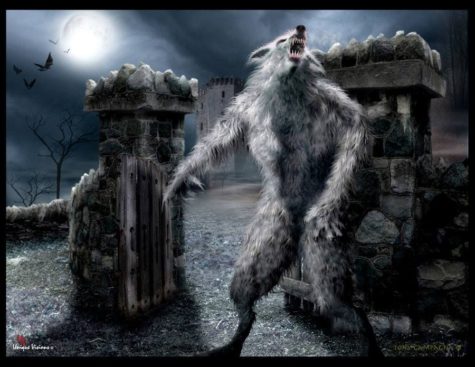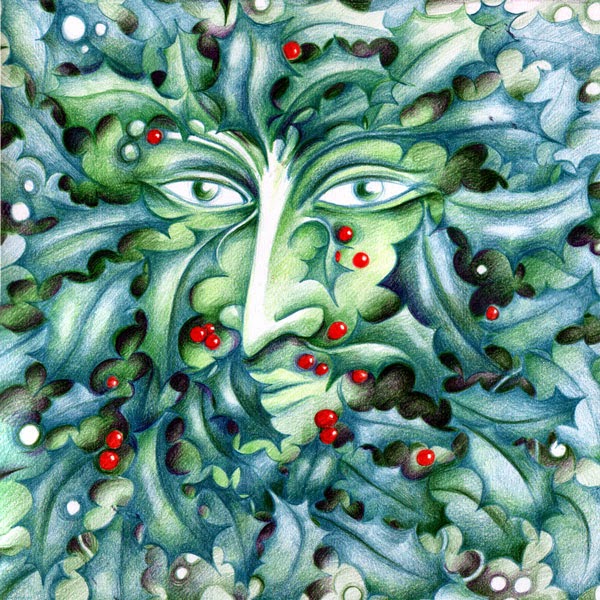Another Case of Lycanthropy
From the book Werwolves, by Elliott O’Donnell, first published in 1912, we have this account of the case of a Lycanthropous brook in the Harz Mountains.
Another case of lycanthropy in Germany, connected with the Harz Mountains, occurred somewhere about the beginning of the last century.
Count Von Breber, chief of the police of Magdeburg, whilst away from home on a holiday with his young and beautiful wife, the Countess Hilda, happened to pass a night in the village of Grautz, in the centre of the Harz Mountains.
In the course of a conversation with the innkeeper, the Countess remarked: “On our way here this morning we crossed a brook, and experienced the greatest difficulty in persuading our dogs to go into the water. It is most unusual, as they are generally only too ready for a dip. Can you in any way account for it?”
“Were there two very tall poplars, one on either side of the brook?” the innkeeper asked; “and did you notice a peculiar – one cannot describe it as altogether unpleasant – smell there?”
“We did!” the Count and Countess exclaimed in chorus.
“Then it was the spot locally known as Wolf Hollow,” the innkeeper said. “No one ventures there after dark, as it has a very evil reputation.”
“Stuff and nonsense!” the Count snapped.
“That is as your honour pleases,” the innkeeper said humbly. “We village folk believe it to be haunted; but, of course, if the subject appears ridiculous to you, I will take care I do not refer to it again.”
“Please do!” the Countess cried. “I love anything to do with the supernatural. Tell us all about it.”
The innkeeper gave a little nervous cough, and glancing uneasily at the Count, whose face looked more than usually stern in the fading sunlight, observed: “They do say, madam, that whoever drinks the water of that stream…”
“Yes, yes?” the Countess cried eagerly.
“Suffers a grave misfortune.”
“Of what nature?” the Countess demanded; but before the innkeeper could answer, the Count cut in:
“I forbid you to say another word. The Countess has drunk the water there, and your cock-and-bull stories will frighten her into fits. Confess it is all made up for the benefit of travellers like ourselves.”
“Yes, your honour!” the innkeeper stammered, his knees shaking; “I confess it is mere talk, but we all be – be – lieve it.”
“That will do – go!” the Count cried; and the innkeeper, terrified out of his wits, flew out of the room.
Some minutes later mine host received a peremptory summons to appear before the Count, who was alone and scowling horribly, in the best parlour. He had barely got inside the room before the Count burst out wrathfully:
“I’ve sent for you, sir, in order to impress upon you the fact that if either you or your minions mention one word about that brook to the Countess, or to her servants – mark that – I will have the breath flogged out of your body and your tongue snipped. Do you hear?”
“Y – yes, your honour,” the innkeeper cried. “I ful – fully un – understand, and if her ladyship asks me any – anything abou – out the br – br – brook, I will lie.”
“Which won’t trouble you much, eh?”
“N – n – o, your honour! I mean y – yes, your honour! It will be a burden on my con – conscience, but I will do anything to pl – please your honour.”
The interview then terminated, and the innkeeper, bathed in perspiration and wishing his lot in life anything but what it was, hastened to prepare dinner.
“I hope nothing dreadful will happen to me; I feel that something will,” the Countess said, as she let down her long beautiful hair that night. “Carl, why did you let me drink the water?”
“The water be – – !” the Count growled. “Didn’t you hear what the innkeeper said? – that the story was mere invention! If you believe all the idle tales you hear, you will soon be in an asylum. Hilda, I’m ashamed of you!”
“And I’m ashamed of myself,” the Countess cried, “so there!” and she flung her arms round his neck and kissed him.
The following morning they left the inn, and, retracing their steps, journeyed homewards. The Count looked at his wife somewhat critically; she was very pale, and there were dark rims under her eyes.
“I do believe, Hilda,” he observed with an assumed gaiety, “you are still worrying about that water!”
“I am,” she replied; “I had such queer dreams.”
He asked her to narrate them, but she refused; and as her sleep now became constantly disturbed, and she was getting thin and worried, the Count determined that as soon as he reached home he would call in a doctor. The latter, examining the Countess, attributed the cause of her indisposition to dyspepsia, and ordered her a diet of milk food. But she did not get better, and now insisted upon sleeping alone, choosing a bedroom situated in a secluded part of the house, where there was absolute silence.
The Count remonstrated. “You might at least let me occupy the room next to you!” he said.
“No,” she replied; “I should hear you if you did. I am sensible now of the very slightest sounds, and besides disturbing me, they are a source of the greatest annoyance. I feel I shall never get well again unless I can have complete rest and quiet. Do let me!” and she fixed her big blue eyes on him so earnestly, that he vowed he would see that all her wishes, no matter how fanciful, were gratified.
“I hope she won’t go mad!” he said to himself; “her behaviour is odd, to say the least of it. Odd! – wholly inexplicable.”
It was rather too bad that just now, when his mind was harassed with misgivings at home, he should also be bothered with disturbances outside his own home. But so it was. Events of an unprecedented nature were taking place in the town, and it fell to his lot to cope with them. Night after night children – mostly of the poorer class – disappeared, and despite frantic yet careful and thorough searches, no clue as to what had befallen them had, so far, been discovered.
The Count doubled the men on night duty, but in spite of these and other extraordinary precautions the disappearances continued, and the affair – already of the utmost gravity – promised to be one that would prove disastrous, not merely to the heads of families, but to the head of the police himself.
So long as the missing ones had been of the lower orders only, the Count had not had much to fear – the murmurings of their parents could easily be held in check – but now that a few of the children of the rich had been spirited away, there was every likelihood of the matter reaching the ears of the Court.
One evening, when the Count had hardly recovered his equanimity after a stormy interview with Herr Meichen, the banker, whose three-year-old daughter had vanished, and a still more distressing scene with Otto Schmidt, the lawyer, whose six-year-old daughter had disappeared, his patience was called upon to undergo a still further trial in consequence of a visit from General Carl Rittenberg, a person of the greatest importance, not only in the town, but in the whole province. Purple in the face with suppressed fury, the General burst into the room where the head of the police sat.
“Count!” he cried, striking the table with his fist, “this is beyond a joke. My child – my only child – Elizabeth, whom my wife and I passionately love, has been stolen. She was walking by my side in Frederick Street this afternoon, and as it suddenly became foggy, I left her a moment to hail a vehicle to take us home. I wasn’t gone from her more than half a minute at the most, but when I returned she had gone.
I searched everywhere, shouting her name; and passers by, compassionate strangers, joined me in my search; but though we have looked high and low not a trace of her have we been able to discover. I have not told her mother yet. God help me – I dare not! I dare not even show my face at home without her – my wife will never forgive me – – “; and so great was his emotion that he buried his face in his hands, and his great body heaved and shook.
Then he started to his feet, his eyes bulging and lurid. “Curse you!” he shrieked; “curse you, Count! it’s all your fault! Day after day you’ve sat here, when you ought to have been hunting up these rascally police of yours. You’ve no right to rest one second – not one second, do you hear? – till the mystery surrounding these poor lost children has been cleared up, and, living or dead – God forbid it should prove to be the latter! – they are restored to their parents.
“Now, mark my words, Count, unless my child Elizabeth is found, I’ll make your name a byword throughout the length and breadth of the country – I’ll – – “; but words failed him, and, shaking his fist, he staggered out of the room.
The Count was much perturbed. The General was one of the few people in the town who really had it in their power to do him harm – the one man above all others with whom he had hitherto made it his business to keep in. He had not the least doubt but that the General meant all he said, and he recognized only too well that his one and only hope of salvation lay in the recovery of Elizabeth. But, God in heaven, where could he look for her?
Sick at heart, he marshaled every policeman in the force, and within an hour every street in Magdeburg was being subjected to a most rigorous search. The Count was just quitting his office, resolved to join in the hunt himself, when a shabbily dressed woman brushed past the custodian at the door, and racing up to him, flung herself at his feet.
“What the devil does she want?” the Count demanded savagely. “Who is she?”
“Martha Brochel, your honour, a poor half-witted creature, who was one of the first in the town to lose a child,” the door-porter replied; “and the shock of it has driven her mad!”
“Mad! mad! Yes! that is just what I am – mad!” the woman broke out. “Everything is in darkness. It is always night! There are no houses, no chimneys, no lanterns, only trees – big, black trees that rustle in the wind, and shake their heads mockingly. And then something hideous comes! What is it? Take it away! Take it away! Give her back to me!” And as Martha’s voice rose to a shriek, she threw her hands over her head, and, clenching them, growled and snarled like a wild animal.
“Put her outside!” the Count said with an impatient gesture; “and take good care she does not get in here again.”
“No! Don’t turn me away! Don’t! don’t!” Martha screamed; “I forgot what it was I wanted to tell you – but I remember now. I’ve seen it! – seen the thing that stole my child. There is light – light again! Oh! hear me!”
“Where have you seen it, Martha?” the porter inquired; and looking at the Count, he said respectfully: “It is just possible, your honour, this woman might be of use to us, and that she has actually seen the person who stole her child.”
“Rubbish! What right has she to have children?” the Count snapped, and he spurned the supplicant with his boot.
The moment she was in the street, however, the head of the police was after her. Keeping close behind her, he resolutely dogged her steps. The evening was now far advanced, and the fog so dense that the Count, though he knew the city, was soon at a total loss as to his whereabouts. But on and on the woman went, now deviating to the right, now to the left; sometimes pausing as if listening, then tearing on again at such a rate that the Count was obliged to run to keep up with her. Suddenly she uttered a shrill cry:
“There it is! There it is! The thing that took my child!” and the figure of what certainly appeared to be a woman, muffled, and carrying a sack on her shoulder, glided across the road just in front of them and disappeared in the impenetrable darkness. Martha sped after her, and the Count, his hopes raised high, followed in hot pursuit. He failed to recognize the ground they were traversing, and presently they came to a high wall, over which Martha scrambled with the agility of an acrobat.
The Count, in attempting to imitate her, damaged his knee and tore his clothes, but he also landed safely on the other side. Then on they went, Martha with unabated energy, the Count horribly exhausted, and beginning to think of turning back, when they were abruptly brought to a standstill. The walls of some building loomed right ahead of them. The object of their pursuit, again visible, darted through a doorway; whilst Martha, with a loud cry of triumph, sprang in after her; but before the Count could cross the threshold the door was slammed and locked in his face.
Then he heard a chorus of the most appalling sounds – sounds so strange and unearthly that his blood turned to ice and his hair rose straight on end. Rushing footsteps mingled with peculiar soft patterings; agonized human screams coupled with the growls and snappings of an animal; a heavy thud; gurgles; and then silence.
The Count’s courage revived: he hurled himself against the door; it gave with a crash, and the next moment he was inside. But what a sight met his eyes! The place, which somehow or the other seemed oddly familiar to him, was a veritable shambles – floor, walls, and furniture were sodden with blood. In every corner were mangled human remains; whilst stretched on the ground, opposite the doorway, lay the body of Martha, her face unrecognizable and her breast and stomach ripped right open.
This was terrible enough, but more terrible by far was the author of it all, who, having cast aside wraps, now stood fully revealed in the yellow glow of a lantern. What the Count saw was a monstrosity – a thing with a woman’s breast, a woman’s hair, golden and curly, but the face and feet were those of a wolf; whilst the hands, white and slender, were armed with long, glittering nails, cruelly sharp and dripping with blood.
To the Count’s astonishment the creature did not attack him, but uttering a low plaintive cry, veered round and endeavoured to escape. But escape was the very last thing Van Breber would permit. Whatever the thing was – beast or devil – it had caused him endless trouble, and if allowed to get away now, would go on with its escapades, and so bring about his ruin.
No! he must kill it. Kill it even at the risk of his own life. With a shout of wrath he plunged his sword up to its hilt in the thing’s back.
It fell to the floor and the Count bent over it curiously. Something was happening – something strange and terrifying; but he could not look – he was forced to shut his eyes. When he opened them he no longer saw the hairy visage of a wolf – he was gazing fondly into the dying eyes of his beautiful and much-loved wife. With a rapidity like lightning, he recognized his surroundings. He was in a long disused summer-house that stood in a remote corner of his own grounds!
“God help me and you, too!” the Countess Hilda whispered, clasping him fondly in her arms. “It was the water! – the water I drank in the Harz Mountains! I have been bewitched…”; and kissing him feverishly on the lips, she sank back – dead.
James Cheney: Invocation To The Dark Mother
Daniel: Prayer Before The Final Battle
blessed obyno: Queen of Ghosts
blessed obyno: Queen of Ghosts
Caerlion Arthur: The Great, Bloody and Bruised Veil of the World





Leave a Reply